七年级英语下unit2知识点归纳与复习人教新目标版
七年级英语下册 Unit 2黄金复习资料 人教新目标版
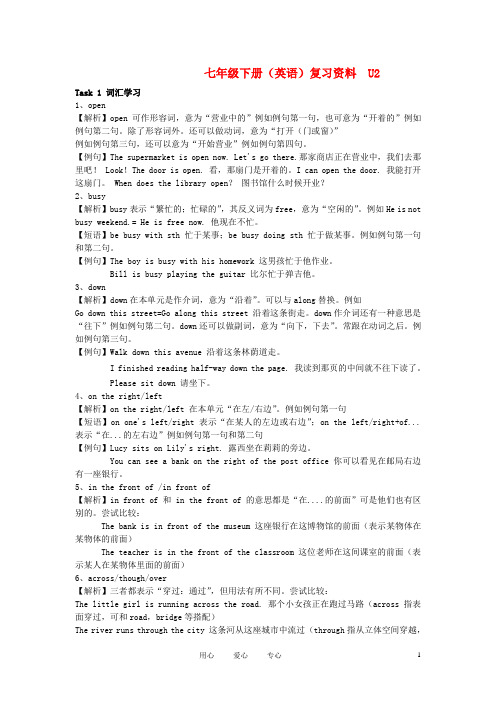
七年级下册(英语)复习资料 U2Task 1 词汇学习1、open【解析】open 可作形容词,意为“营业中的”例如例句第一句,也可意为“开着的”例如例句第二句。
除了形容词外。
还可以做动词,意为“打开(门或窗)”例如例句第三句,还可以意为“开始营业”例如例句第四句。
【例句】The supermarket is open now. Let's go there.那家商店正在营业中,我们去那里吧! Look!The door is open. 看,那扇门是开着的。
I can open the door. 我能打开这扇门。
When does the library open?图书馆什么时候开业?2、busy【解析】busy表示“繁忙的;忙碌的”,其反义词为free,意为“空闲的”。
例如He is not busy weekend.= He is free now. 他现在不忙。
【短语】be busy with sth 忙于某事;be busy doing sth 忙于做某事。
例如例句第一句和第二句。
【例句】The boy is busy with his homework 这男孩忙于他作业。
Bill is busy playing the guitar 比尔忙于弹吉他。
3、down【解析】down在本单元是作介词,意为“沿着”。
可以与along替换。
例如Go down this street=Go along this street 沿着这条街走。
down作介词还有一种意思是“往下”例如例句第二句。
down还可以做副词,意为“向下,下去”。
常跟在动词之后。
例如例句第三句。
【例句】Walk down this avenue 沿着这条林荫道走。
I finished reading half-way down the page. 我读到那页的中间就不往下读了。
Please sit down 请坐下。
七年级英语下册 Unit 2Where’s the post office必背句子与词组 人教新目标版

Unit 2 Where’s the post office? (ok)单元必背句子与词组1. 问路:(1) Excuse me, how can I get to the post office?(2) Excuse me, can you tell me the way to the post office?2. --这儿附近有一个邮局吗?--是的。
-- Yes, there is. (否定:No, there isn’t.)① there be 翻译为“有”,不能拆开翻译。
用法:单数/不可数;复数;near here = in the neighborhood3. –邮局在哪里?-- Where is the post office?--它在第五大街上。
--第五:用序数词on4. 它在沿大桥街右侧:It’s down Bridge Street on the right.down…street on the left5. 散步通过花园:指“穿过park 的内部”)6. Next to the hotel is a smallabeautiful garden. (不能用has)7. 我爸爸很享受散步的乐趣:My father enjoys taking a walk very much.enjoy doing sthgo for a walk8. 这是花园之旅的开始:This is the beginning of the garden.beginning 如:Let’s read fromof this book.9.大桥街是一个很好玩的地方:10. 让我告诉你去我家的路:Let me tell you the way to my house.the way to sp. one’sway toa good way to do sth11.比较:(1) in front of…在(外部)的前面;如:There isa big my house.(2) in the front of…在(内部)的前面; 如:比较:(表示“位置”)在…前面:in front of… 在…后面:behind… (表示“时间”)在…之前:before… 在…之后:after…12. 在左边/右边:on the left/right. 在…左边/右边:13. 笔直走:go straight 沿着…街(路)走:go down…Street/Road(两者合并)沿着…街(路)笔直走:go straight down…Street/Road14. 向左转:turn left 向右转:15. 玩得(很)高兴:16. 打的去某地:乘公交乘公交车去某地:17. 我希望你过一个愉快的旅途:18. 到达某地方:(1) arrive in+大地方; arrive at+小地方;(2) arrive单独使用;如:(3) get to+19. 穿过:(1) 从表面穿过:walk acorss the road 了 (2) 从内部穿过:walk through the park20. 在…上面:(1) on (指“表面接触”) 如:over (指“表面不接触”,悬空) 如:(1) 翻译为“一…”,用a/an; (2) 翻译为“这…”或“不需要翻译”,用the;如:(1) There is ______ old man next to ______ post office. (2) –Do you know ______ London? -- Of cou rse. It’s in _____ United Kingdom.22. (1) straight adv. 笔直地;如:Go turn left. (2) straightadj. 直的;如:23. (1) turn v. 转弯;轮到某人的一次机会;24. (1) left n. 左边;如:left v. 离开leave的过去式;如:25. (1) right n. 右边;如:The post office is on right adj.正确的;如:26. (1) down adv. 向下;如:沿着;如:27. (1) open v. 打开;如: The at seven o’clock am. (2) open adj.开着的;营业中的;如:28. (1) clean v. 打扫;如:the classroom every day. (2) clean adj.干净的;如:29. (1) if 如果;you are hungry, you can buy some food in the supermarket.(2) if 是否;30. (1) visit=see v. 参观,访问; (2) visit n. 看望,拜访;pay a visit to sp/sb。
人教版初一七年级英语(下)第二单元Unit2知识点+语法整合
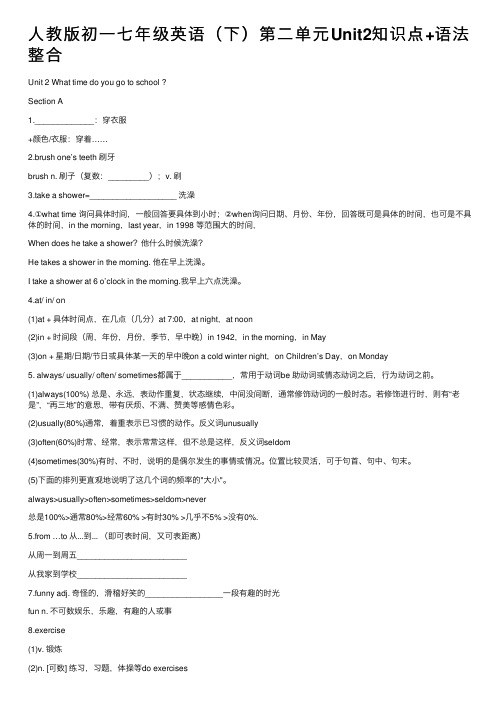
⼈教版初⼀七年级英语(下)第⼆单元Unit2知识点+语法整合Unit 2 What time do you go to school ?Section A1._____________:穿⾐服+颜⾊/⾐服:穿着……2.brush one’s teeth 刷⽛brush n. 刷⼦(复数:_________);v. 刷3.take a shower=___________________ 洗澡4.①what time 询问具体时间,⼀般回答要具体到⼩时;②when询问⽇期、⽉份、年份,回答既可是具体的时间,也可是不具体的时间,in the morning,last year,in 1998 等范围⼤的时间,When does he take a shower?他什么时候洗澡?He takes a shower in the morning. 他在早上洗澡。
I take a shower at 6 o’clock in the morning.我早上六点洗澡。
4.at/ in/ on(1)at + 具体时间点,在⼏点(⼏分)at 7:00,at night,at noon(2)in + 时间段(周,年份,⽉份,季节,早中晚)in 1942,in the morning,in May(3)on + 星期/⽇期/节⽇或具体某⼀天的早中晚on a cold winter night,on Children’s Day,on Monday5. always/ usually/ often/ sometimes都属于___________,常⽤于动词be 助动词或情态动词之后,⾏为动词之前。
(1)always(100%) 总是、永远,表动作重复,状态继续,中间没间断,通常修饰动词的⼀般时态。
若修饰进⾏时,则有“⽼是”,“再三地”的意思,带有厌烦、不满、赞美等感情⾊彩。
(2)usually(80%)通常,着重表⽰已习惯的动作。
新目标(人教)七年级下册英语单元复习课件 Unit 2复习课件

具体时刻,也可询问日期、月份、年份等。 ②when常用来提问年、月、日、上/下午等大概时间,此时
when不可与what time替换。
From twelve o'clock at night to six o'clock in the morning.从夜里十二点到早上六点。
on weekends
radio show
16.几点 ____w_h__a_t_t_i_m__e_______
1178..一半份小有时趣__的__工___作____a__n____i__n__t__e__r__e___s__ti_n_g__j_o_b__ 19.要么……要h么al…f …an;h或ou者r……或者…… ____________________ 20.做作业 _________________________
either...or...
do (one’s) homework
21.去睡觉 __g_o__t_o__b__e_d_________ 2223..到散家 步;__走g__e一_t__走h_o__m_____e_________________________ 24.快速地吃 _________ta__k_e__a__w_a__lk_ 25.做运动 ____________________
play computer games
go home
三、核心句型
1. 里克,你通常几点钟洗淋浴?
__W__h_a_t_ _t_im__e___ do you usually _t_a_k_e__ __a_ _s_h_o_w__e_r,Rick? 2. 我通常在六点半起床。 I _______ ____ _____ at six thirty. 3.u—su—a斯lly科g特et,u你p的广播节目在几点?——从夜里12点到早上6点。 —Scott,________ ________ is your radio show? —_______ wtwhealvte o'cltoimckeat night _______ six o'clock in the morning.
2019-2020学年七年级英语下册 Unit 2 What time do you go to school知识点总结+导学案(新版)人教新目标版

2019-2020学年七年级英语下册 Unit 2 What time do you go to school知识点总结+导学案(新版)人教新目标版学习目标:1.熟练读出书写本节课的表示活动的单词。
2.学会询问时间的句型,熟练的谈论表示时间的话题。
重难点:what time/when 引导的特殊疑问句;频率副词的用法。
情感目标:通过询问和谈论彼此的作息习惯,培养良好的学习习惯。
学习过程:Ⅰ.【课前热身】预习效果检测: 默写下列短语。
去上学起床跑步吃早餐洗澡通常几点,什么时候穿上衣服刷牙Ⅱ.【自主学习】1.给图片找到对应的短语 1a2.听录音完成下列部分1b,2a,2bⅢ.【合作学习】与同伴练习1b中的对话Ⅳ.【拓展提升】根据1b,2b部分创编新对话, 完成1c,2c对话表演。
Ⅴ.【答疑解惑】针对本课提出困惑的知识点或问题。
Ⅵ.【课堂小结】总结本课所学知识点。
Ⅶ.【达标检测】一、翻译句子。
1.你通常几点钟起床?What _______ do you ________get ________?2.我通常在12:00吃午餐。
I ________ eat _______ ________12:00.3.你通常什么时候起床?______do you usually _____ ______?4.我通常6点钟起床。
I usually _____ _____at six______.5. 我从来不起这么早。
I _____get up so______.6. 他有一份有趣的工作。
He _____ an ______ job.备课人:7. 那是一个有趣的早餐时刻。
That’s a ____time ______ _______.8、It’s 7 o’clock.(对划线部分提问)______ ______ is it?9、Alicia takes a shower at 9:00 (对划线部分提问)______ _____ does Alicia ______ ___ ________?10、Jim gets up at 6:00 in the morning.(变成否定句)Jim _______ ____ ____ at 6:00 in the morning.11、他们总是在7:20穿衣服。
人教七年级下册英语unit2知识点总结
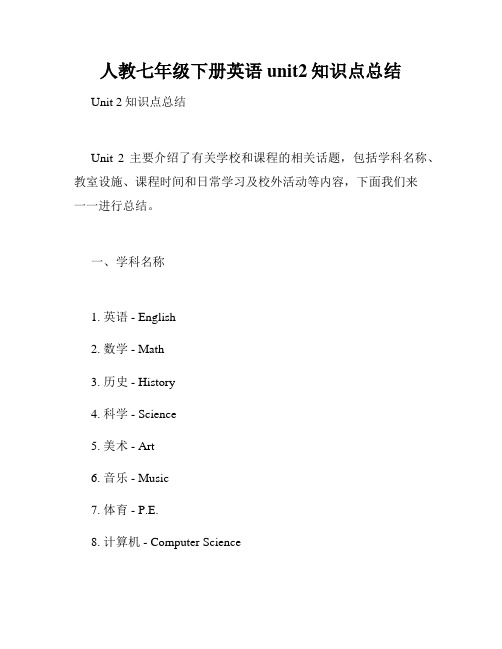
人教七年级下册英语unit2知识点总结Unit 2知识点总结Unit 2主要介绍了有关学校和课程的相关话题,包括学科名称、教室设施、课程时间和日常学习及校外活动等内容,下面我们来一一进行总结。
一、学科名称1. 英语 - English2. 数学 - Math3. 历史 - History4. 科学 - Science5. 美术 - Art6. 音乐 - Music7. 体育 - P.E.8. 计算机 - Computer Science二、教室设施1. 黑板 - blackboard2. 白板 - whiteboard3. 投影仪 - projector4. 音响 - sound system5. 地图 - map6. 水龙头 - tap7. 电视 - TV8. 电脑 - computer9. 灯 - light10. 窗户 - window三、课程时间1. 上午 - in the morning2. 下午 - in the afternoon3. 晚上 - in the evening4. 早上 - in the early morning5. 夜晚 - at night6. 每周 - every week7. 每天 - every day8. 周末 - on weekends四、日常学习1. 做作业 - do homework2. 练习 - practice3. 复习 - review4. 读书 - read books5. 写作 - write compositions6. 讨论 - have discussions7. 板书笔记 - take notes8. 教师讲解 - teacher's explanation9. 学习笔记 - study notes10. 做练习 - do exercises五、校外活动1. 课外活动 - extracurricular activities2. 运动会 - sports meeting3. 聚会 - party4. 社交活动 - social activities5. 英语角 - English corner6. 爱好小组 - hobby group7. 社团活动 - club activities8. 学校之旅 - school trip以上就是Unit 2的主要内容,希望能够帮助大家更好地学习英语,更好地了解学校和课程的相关话题。
七年级英语人教版下册Unit2重点知识点归纳
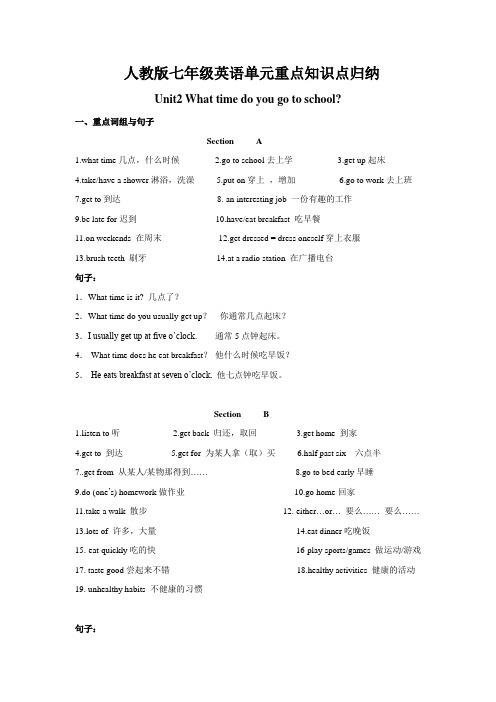
人教版七年级英语单元重点知识点归纳Unit2 What time do you go to school?一、重点词组与句子Section A1.what time几点,什么时候2.go to school去上学3.get up起床4.take/have a shower淋浴,洗澡5.put on穿上,增加6.go to work去上班7.get to到达8. an interesting job 一份有趣的工作9.be late for迟到10.have/eat breakfast 吃早餐11.on weekends 在周末12.get dressed = dress oneself穿上衣服13.brush teeth 刷牙14.at a radio station 在广播电台句子:1.What time is it? 几点了?2.What time do you usually get up?你通常几点起床?3.I usually get up at five o’clock. 通常5点钟起床。
4.-What time does he eat breakfast?他什么时候吃早饭?5.-He eats breakfast at seven o’clock. 他七点钟吃早饭。
Section B1.listen to听2.get back 归还,取回3.get home 到家4.get to 到达5.get for 为某人拿(取)买6.half past six 六点半7..get from 从某人/某物那得到……8.go to bed early早睡9.do (one’s) homework做作业10.go home回家11.take a walk 散步12. either…or…要么……要么……13.lots of 许多,大量14.eat dinner吃晚饭15. eat quickly吃的快16 play sports/games 做运动/游戏17. taste good尝起来不错18.healthy activities 健康的活动19. unhealthy habits 不健康的习惯句子:1.When do students usually eat dinner?学生们通常什么时候吃晚餐?2.I don’t have much time for breakfast.我没有许多时间吃早餐。
人教版七年级英语下册Unit.2 重点词汇及句型归纳总结
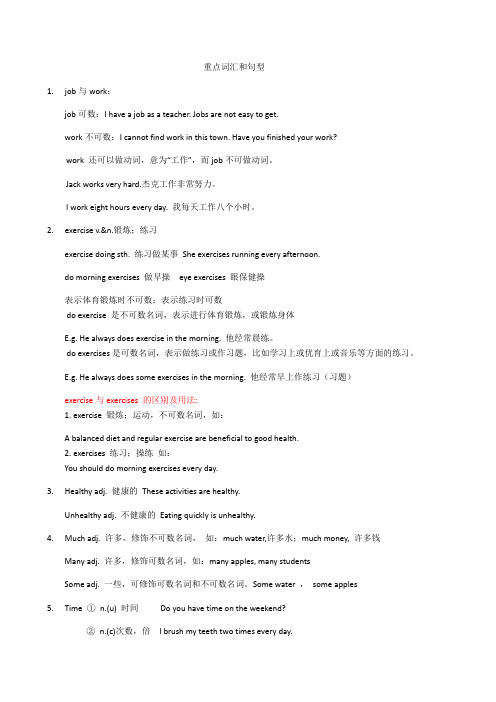
重点词汇和句型1.job与work:job可数:I have a job as a teacher. Jobs are not easy to get.work不可数:I cannot find work in this town. Have you finished your work?work 还可以做动词,意为“工作”,而job不可做动词。
Jack works very hard.杰克工作非常努力。
I work eight hours every day. 我每天工作八个小时。
2.exercise v.&n.锻炼;练习exercise doing sth. 练习做某事She exercises running every afternoon.do morning exercises 做早操eye exercises 眼保健操表示体育锻炼时不可数;表示练习时可数do exercise 是不可数名词,表示进行体育锻炼,或锻炼身体E.g. He always does exercise in the morning. 他经常晨练。
do exercises是可数名词,表示做练习或作习题,比如学习上或优育上或音乐等方面的练习。
E.g. He always does some exercises in the morning. 他经常早上作练习(习题)exercise与exercises 的区别及用法:1. exercise 锻炼;运动,不可数名词,如:A balanced diet and regular exercise are beneficial to good health.2. exercises 练习;操练如:You should do morning exercises every day.3.Healthy adj. 健康的These activities are healthy.Unhealthy adj. 不健康的Eating quickly is unhealthy.4.Much adj. 许多,修饰不可数名词,如:much water,许多水;much money, 许多钱Many adj. 许多,修饰可数名词,如:many apples, many studentsSome adj. 一些,可修饰可数名词和不可数名词。
人教版七年级英语下册Unit 2知识点汇总
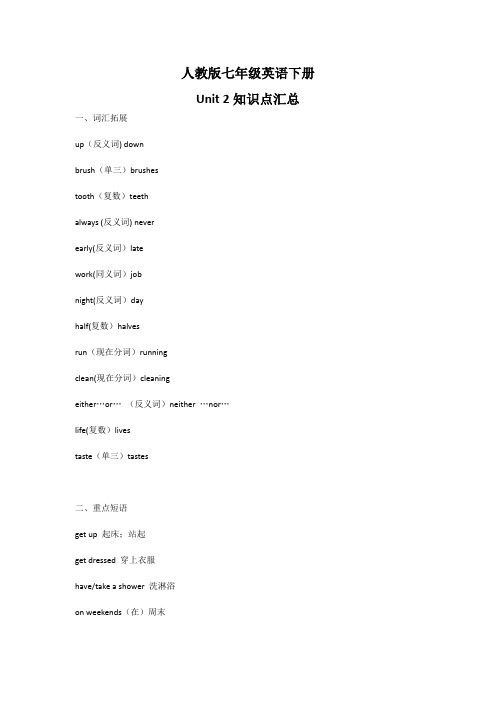
人教版七年级英语下册Unit 2知识点汇总一、词汇拓展up(反义词) downbrush(单三)brushestooth(复数)teethalways (反义词) neverearly(反义词)latework(同义词)jobnight(反义词)dayhalf(复数)halvesrun(现在分词)runningclean(现在分词)cleaningeither…or…(反义词)neither …nor…life(复数)livestaste(单三)tastes二、重点短语get up 起床;站起get dressed 穿上衣服have/take a shower 洗淋浴on weekends(在)周末do (one’s) homework 做作业take a walk 散步;走一走lots of=many+可数(复数)大量,许多either…or... 要么…要么…;或者………或者…brush teeth 刷牙have(eat) breakfast /dinner吃早餐/晚餐go to school 去学校at night 在晚上from…to…从……到……in the morning/ afternoon /evening 在上午/下午/晚上go to work 去上班That's a funny time for…那是做……有意思的时间。
be late for………迟到on school days 在上学期间a quarter past /to+钟点数……过/差一刻钟go to bed 上床睡觉half past +钟点数……点半go home回家eat quickly 吃得快play sports 做运动have much time for …有许多时间做……for half an hour 半小时get home 到家eat a good breakfast 早餐吃得好,好好吃一顿早餐eat …for lunch午餐吃……after lunch /dinner 午餐/晚餐后be (not) good for 对……健康有(没)益taste good 尝起来好吃have a very healthy life 有健康的生活need to do …需要做……from Monday to Friday从周一到周五radio station 广播电台make breakfast for sb. 替某人做早饭get to school 到校三、经典句型1.---What time do you usually get up,Rick?里克,你通常几点起床?---I usually get up at six thirty.我通常六点半起床2.---When does Scott go to work?斯科特什么时候去上班?---He always goes to work at eleven o'clock.他总是在十一点去上班。
人教版七年级英语下册第二单元知识点归纳总结Unit-2
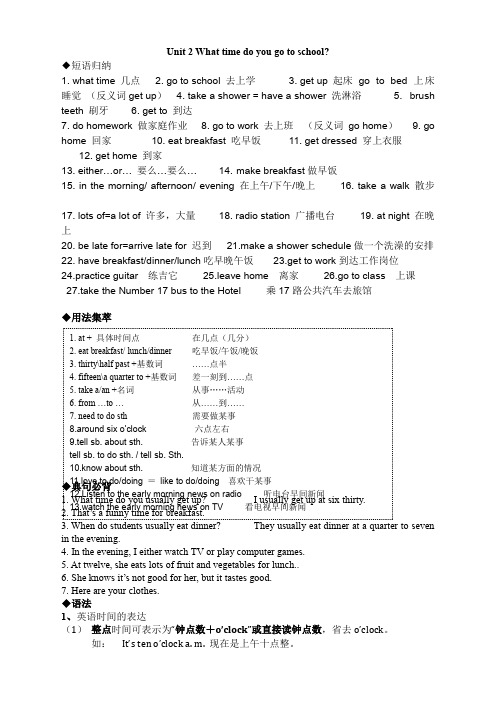
Unit 2 What time do you go to school?◆短语归纳1. what time 几点2. go to school 去上学3. get up 起床 go to bed 上床睡觉 (反义词get up )4. take a shower = have a shower 洗淋浴5. brush teeth 刷牙6. get to 到达7. do homework 做家庭作业 8. go to work 去上班 (反义词 go home ) 9. go home 回家 10. eat breakfast 吃早饭 11. get dressed 穿上衣服12. get home 到家13. either…or… 要么…要么… 14. make breakfast 做早饭15. in the morning/ afternoon/ evening 在上午/下午/晚上 16. take a walk 散步17. lots of=a lot of 许多,大量 18. radio station 广播电台 19. at night 在晚上20. be late for=arrive late for 迟到 21.make a shower schedule 做一个洗澡的安排22. have breakfast/dinner/lunch 吃早晚午饭 23.get to work 到达工作岗位24.practice guitar 练吉它 25.leave home 离家 26.go to class 上课27.take the Number 17 bus to the Hotel 乘17路公共汽车去旅馆◆用法集萃 ◆典句必背 1. What time do you usually get up? I usually get up at six thirty. 2. That’s a funny time for breakfast. in the evening.4. In the evening, I either watch TV or play computer games.5. At twelve, she eats lots of fruit and vegetables for lunch..6. She knows it’s not good for her, but it tastes good.7. Here are your clothes.◆语法1、英语时间的表达(1) 整点时间可表示为“钟点数+o’clock”或直接读钟点数,省去o’clock 。
七年级英语下Unit 2 知识点归纳与复习人教新目标版

新目标七年级下Unit 2 知识点归纳与复习单元知识清单一、重点单词:1. libr r 图书馆2. rest rant 餐馆3. superm ket 超市4. str t 街道5. p k 公园6. c nt 中心7. br ge 桥8. n 在……附近9. acr 横过10. n xt 贴近11. betw n 在两者之间12. fr nt 前面13. t n 转弯14. l ft 左边15. r t 右边16. cl n 清洁的17. qu t 宁静的18. d ty 肮脏的19. h se 房子20. welc m 欢迎21. g den 花园22. enj 欣赏23. w k 散步24. thr 穿过25. begin 开始26. t 旅行27. v s t 参观28. pl ce 地方29. h gry 饥饿的30. a ive 到达31. w 路线32. t ke 乘, 坐33. t x 出租车34. airp t 飞机场35. p ss 通过36. h pe 希望二、必会短语1. post 邮局2. phone 投币式公用电话3. in of 在……前面4. on 在右边5. take 散步6. fun 玩得开心7. turn 向左转8. across 在……对面9. take 坐出租车10. have a 旅途愉快三、应知语法和句式:1. 表示在某地有某物用there be。
如:在这附近有一家银行。
a bank near here.2. There de 的一般问句是将be放到there的前面。
如:有一个超市吗?a supermarket?肯定回答是:Y es, .否定回答是:No, .3. 本课学习的两种问路方式:一种是:用Is there …? 如:在这附近有公用电话吗?a pay phone near here?另一种是:用Where is the …? 如:图书馆在哪?the library?4. welcome to …表示欢迎到某地。
人教版英语七年级下册Unit2知识点精析+课文注释

人教版英语七年级下册Unit2知识点精析+课文注释Section A重点单词dress穿衣服;连衣裙up向上brush刷;刷净;刷子tooth牙齿shower淋浴;淋浴器(间)usually 通常地;一般地forty 四十never从不;绝不fifty五十early早(的)job工作;职业work工作o'clock(表示整点)……点钟station电(视)台;车站night晚上;夜晚funny 奇怪的;滑稽好笑的exercise锻炼;练习best最好的;最好地;最group组;群重点短语get up起床;站起go to school去上学get dressed 穿上衣服brush teeth 刷牙eat breakfast 吃早饭take a shower 洗淋浴radio station 广播电台at night 在晚上go to work 去上班be late for 迟到on weekends (在)周末重点句型1.-What time do you usually get up,Rick?里克,你通常几点起床?-I usually get up at six thirty.我通常6:30起床。
2.I never get up so early.我从不那么早起床。
3.That's funny time for breakfast!那个时间吃早饭真有意思呀!4. After that, I usually exercise at about ten twenty.在那之后,我通常在10:20左右锻炼。
Section B重点单词half一半;半数past晚于;过(时间);过去的quarter一刻钟;四分之一homework家庭作业clean打扫;弄干净;干净的run跑;奔walk行走;步行quickly 很快地either或者;也(用在否定词组后)lot大量;许多sometimes有时taste有……的味道;品尝;味道;滋味life生活;生命重点短语do(one’s) homework做作业go to bed 上床睡觉take a walk 散步;走一走play sports 做运动get home 到家either...or... 要么......要么......;或者......或者......lots of 大量;许多from...to...从......到......重点句型1.When do students usually eat dinner?学生们通常什么时候吃晚饭?2. In the evening, I either watch TV or play computer games.在晚上,我要么看电视,要么玩电脑游戏。
人教版(新目标)初中英语七年级下册Unit 2
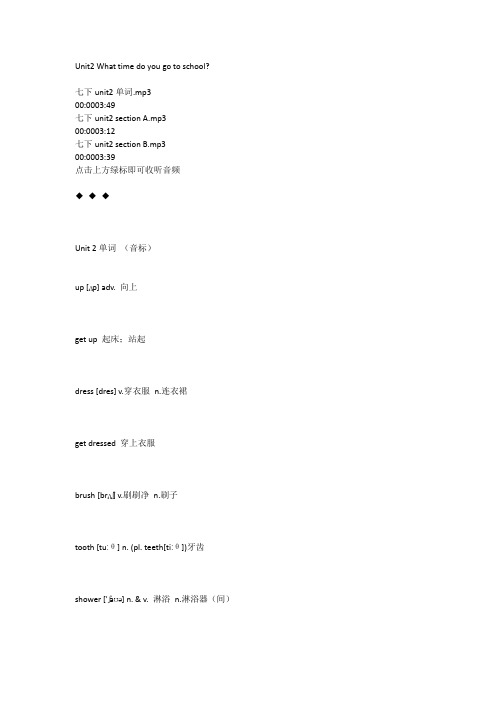
Unit2 What time do you go to school?七下unit2单词.mp300:0003:49七下unit2 section A.mp300:0003:12七下unit2 section B.mp300:0003:39点击上方绿标即可收听音频◆◆◆Unit 2单词(音标)up [ʌp] adv. 向上get up 起床;站起dress [dres] v.穿衣服n.连衣裙get dressed 穿上衣服brush [brʌʃ] v.刷刷净n.刷子tooth [tuːθ] n. (pl. teeth[tiːθ])牙齿shower ['ʃaʊə] n. & v. 淋浴n.淋浴器(间)take a shower 洗淋浴usually ['ju:ʒuəli] adv.通常地;一般地forty ['fɔ:(r)ti] num.四十wow [waʊ] interj.(表示惊奇或敬佩)哇;呀never ['nevə(r)] adv.从不;绝不early ['ɜːlɪ] adv. & adj.早(的)fifty ['fɪftɪ] num.五十job [dʒɒb], [dʒɑːb] n.工作;职业work [wɜːk] v. & n. 工作station ['steɪʃn] n.电(视)台;车站radio station 广播电台o'clock [ə'klɒk], [ə'klɑ:k] adv.(表示整点)……点钟night [naɪt] n. 晚上;夜晚funny ['fʌnɪ] adj.奇怪的;滑稽好笑的exercise ['eksəsaɪz] v. & n. 锻炼;练习on weekends (在)周末best [best] adj.最好的adv.最好地;最group [gruːp] n.组;群half [hɑːf], [hæf] n. & pron. 一半;半数past [pɑːst],[pæst] prep.晚于;过(时间)adj.过去的quarter ['kwɔː(r)tə(r)] n.一刻钟;四分之一homework['həʊmwɜː(r)k] n. 家庭作业do (one’s) homework 做作业run [rʌn] v. 跑;奔clean [kliːn] v.打扫;弄干净adj.干净的walk [wɔːk] n. & v. 行走;步行take a walk 散步;走一走quickly ['kwɪkli] adv. 很快地either ['aɪðə(r)], [ 'iːðə(r) ]adv.或者;也(用在否定词组后)either…or…要么……要么……;或者……或者……lot [lɒt], [lɑ:t] pron.大量;许多lots of 大量;许多sometimes ['sʌmtaɪmz] adv.有时taste [teɪst] v.有……的味道;品尝n.味道;滋味life [laɪf] n.生活;生命Rick [rɪk] 里克(男名)Jim [dʒɪm] 吉姆(男名)Scott [skɒt], [skɑ:t] 斯科特(男名)Tony ['təʊnɪ] 托尼(男名)unit2电子课本Unit2 知识梳理◆短语归纳1. what time 几点2. go to school 去上学3. get up 起床4. take a shower 洗淋浴5. brush teeth 刷牙6. get to 到达7. do homework 做家庭作业8. go to work 去上班9. go home 回家10. eat breakfast 吃早饭11. get dressed 穿上衣服12. get home 到家13. either…or…要么…要么…14. go to bed 上床睡觉15. in the morning/afternoon/evening 在上午/下午/晚上16. take a walk 散步17. lots of=a lot of 许多,大量18. radio station 广播电台19. at night 在晚上20. be late for=arrive late for 迟到◆用法集萃1. at + 具体时间点在几点(几分)2. eat breakfast/lunch/dinner 吃早饭/午饭/晚饭3. thirty/half past +基数词…点半4. fifteen/a quarter to +基数词差一刻到…点5. take a/an+名词从事…活动6. from…to…从…到…7. need to do sth 需要做某事◆典句必背1. —What time do you usually get up? 你通常几点钟起床?—I usually get up at six thirty. 我通常6:30起床。
Unit2单元知识点总结人教版七年级英语下册
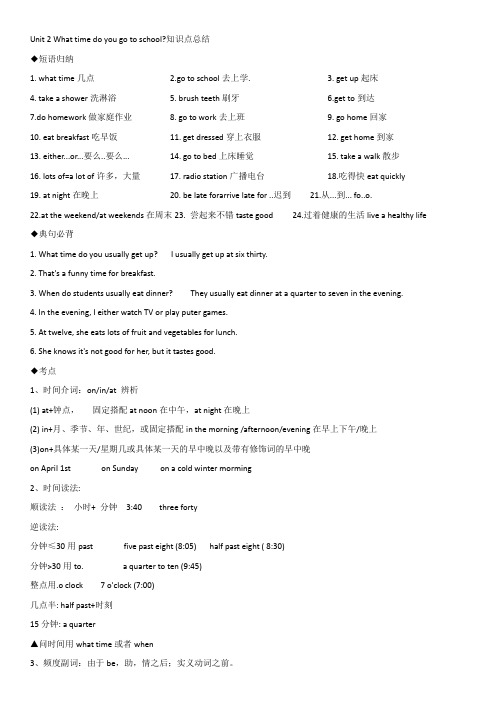
Unit 2 What time do you go to school?知识点总结◆短语归纳1. what time几点2.go to school去上学.3. get up起床4. take a shower洗淋浴5. brush teeth刷牙6.get to到达7.do homework做家庭作业8. go to work去上班9. go home回家10. eat breakfast吃早饭11. get dressed穿上衣服12. get home到家13. either...or...要么..要么... 14. go to bed上床睡觉15. take a walk散步16. lots of=a lot of许多,大量17. radio station广播电台18.吃得快eat quickly 19. at night在晚上20. be late forarrive late for ..迟到21.从...到... fo..o.22.at the weekend/at weekends在周末23. 尝起来不错taste good 24.过着健康的生活live a healthy life◆典句必背1. What time do you usually get up? I usually get up at six thirty.2. That's a funny time for breakfast.3. When do students usually eat dinner? They usually eat dinner at a quarter to seven in the evening.4. In the evening, I either watch TV or play puter games.5. At twelve, she eats lots of fruit and vegetables for lunch.6. She knows it's not good for her, but it tastes good.◆考点1、时间介词:on/in/at 辨析(1) at+钟点,固定搭配at noon在中午,at night在晚上(2) in+月、季节、年、世纪,或固定搭配in the morning /afternoon/evening在早上下午/晚上(3)on+具体某一天/星期几或具体某一天的早中晚以及带有修饰词的早中晚on April 1st on Sunday on a cold winter morming2、时间读法:顺读法:小时+ 分钟3:40 three forty逆读法:分钟≤30用past five past eight (8:05) half past eight ( 8:30)分钟>30用to. a quarter to ten (9:45)整点用.o clock 7 o'clock (7:00)几点半: half past+时刻15分钟: a quarter▲问时间用what time或者when3、频度副词:由于be,助,情之后;实义动词之前。
初中英语人教新目标七年级下册Unit 2 单元知识点

七年级英语下册Unit 2知识点【Useful expressions】1.what time 几点2.go to school 去上学3.get up 起床4.take a shower 洗淋浴5.brush teeth 刷牙6.get to 到达7.do homework 做家庭作业8.go to work 去上班9.go home 回家10.eat breakfast 吃早饭11.get dressed 穿上衣服12.get home 到家13.either…or…要么…要么…14.go to bed 上床睡觉15.in the morning/afternoon/evening 在上午/下午/晚上16.take a walk 散步17.lots of=a lot of 许多,大量18.radio station 广播电台19.at night 在晚上20.be late for=arrive late for 迟到21.be good for…..对…….有益22.taste good 尝起来好23.do her homework 做她的家庭作业24.have a healthy life 有一个健康的生活方式25.have dinner 吃晚饭26.after that 在那之后27.get home from school 放学回家28.half an hour 半个小时29.live a healthy life 过健康的生活【Target sentences】1.—What time do you usually get up?— I usually get up at six thirty.2.— What time does Rick eat breakfast?—He eats breakfast at seven o’clock.3.— When does Scott go to work?—He always goes to work at eleven o’clock.4.What time do they get dressed?They always get dressed at seven twenty.5.When do your friends exercise?They usually exercise on weekends.6.I don’t have much time for breakfast, so I usually eat very quickly.7.I either watch TV or play computer games.8.At twelve, she eats lots of fruit and vegetables for lunch.9.She knows it’s not good for her, but it tastes good!10.After school, I sometimes play basketball for half an hour.【Language points】1.get dressedget dressed 穿上衣服【用法详解】get dressed为固定短语,表示穿的动作。
人教版七年级英语下 Unit2 知识点语法归纳总结
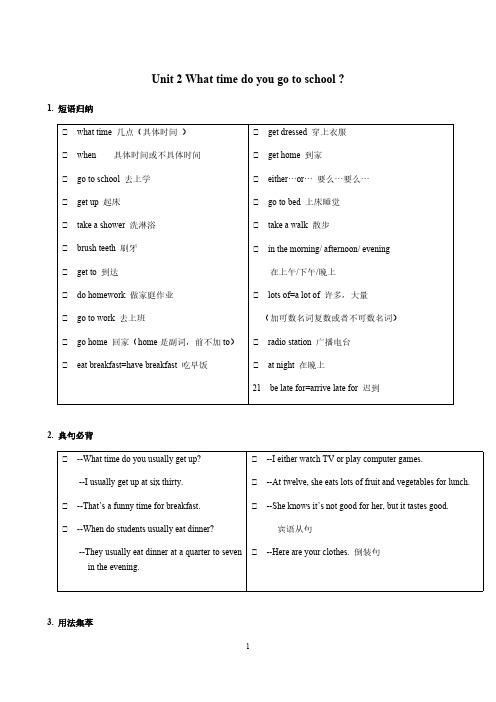
Unit 2 What time do you go to school ?1.短语归纳①what time 几点(具体时间)①when具体时间或不具体时间①go to school 去上学①get up 起床①take a shower 洗淋浴①brush teeth 刷牙①get to 到达①do homework 做家庭作业①go to work 去上班①go home 回家(home是副词,前不加to)①eat breakfast=have breakfast 吃早饭①get dressed 穿上衣服①get home 到家①either…or…要么…要么…①go to bed 上床睡觉①take a walk 散步①in the morning/ afternoon/ evening在上午/下午/晚上①lots of=a lot of 许多,大量(加可数名词复数或者不可数名词)①radio station 广播电台①at night 在晚上21 be late for=arrive late for 迟到2.典句必背①--What time do you usually get up?--I usually get up at six thirty.①--That’s a funny time for breakfast.①--When do students usually eat dinner?--They usually eat dinner at a quarter to sevenin the evening. ①--I either watch TV or play computer games.①--At twelve, she eats lots of fruit and vegetables for lunch.①--She knows it’s not good for her, but it tastes good.宾语从句①--Here are your clothes. 倒装句3.用法集萃(1)What time do you usually get up , Rick?①频度副词:表示动作频率的副词辨析:always, usually, often, sometimes, seldom, never频度频度副词含义举例always一直;总是The sun always rises in the east and sets in the west.太阳总是东升西落usually通常I usually ask my father for help. 我通常会向我爸爸求助often经常It often rains here in April. 这儿四月份常下雨sometimes有时;不时I sometimes wait for him at the school gate.我有时在学校大门口等他seldom/hardly/hardly/ever很少;几乎不I don’t like swimming, so I seldom go swimming.我不喜欢游泳,所以我很少去游泳频率由高到低never从不;从来没有I never tell lies. 我从不说谎①常见的get 短语get up 起床;站起get back 回来get on 上车get out 出去get off 下车get to 到达get dressed 穿上衣服get married 结婚get together 相聚;聚会get ready (for) (为...)做好准备(2)辨析 get dressed 与 be dressed in①get dressed 表示“穿”的动作①be dressed in 表示“穿”的状态①拓展:dress, put on, wear, be indress其后可跟表示人的名词或代词,意为“给...穿衣服”She can dress herself.她会自己穿衣服put on意为“穿上;戴上”,强调“穿、戴”的动作You’d better put on your coat.你最好穿上你的外套wear意为“穿着;戴着”,强调“穿、戴”的状态She is wearing a beautiful evening dress.她穿着一件漂亮的晚礼服be in其后可跟衣服或颜色类的词汇,也表示“穿、戴”的状态The girl in red is my sister.那个穿红色衣服的是我的妹妹(3)辨析:at, in,on→I usually get up at six thirty.at at和时间点搭配,还可以和noon,night等搭配at nine o’clock/at nightin in和年、月、季节搭配,还可以和morning,evening等搭配in July/in summer/in the morning on on和星期、日期搭配,还可以表示在具体某一天的上午、下午或晚上on Sunday/on June 1st(4)exercise的用法→ After that, I usually exercise at about ten twenty.那之后我通常在10点20分左右锻炼身体①作动词,意为“锻炼”,可作及物动词,也可作不及物动词例:How often do you exercise? 你多久锻炼一次?He exercises his body every day. 他每天锻炼身体。
人教版七年级下册英语Unit-2单元知识点复习
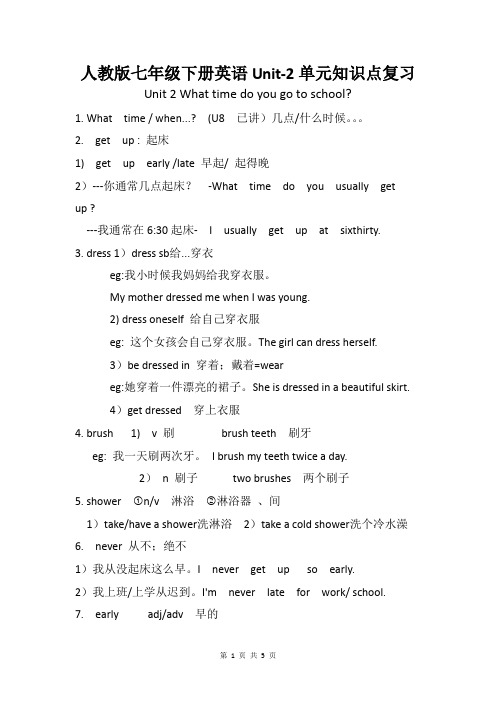
人教版七年级下册英语Unit-2单元知识点复习Unit 2 What time do you go to school?1. What time / when...? (U8 已讲)几点/什么时候。
2. get up : 起床1) get up early /late 早起/ 起得晚2)---你通常几点起床?-What time do you usually getup ?---我通常在6:30起床- I usually get up at sixthirty.3. dress 1)dress sb给...穿衣eg:我小时候我妈妈给我穿衣服。
My mother dressed me when I was young.2) dress oneself 给自己穿衣服eg: 这个女孩会自己穿衣服。
The girl can dress herself.3)be dressed in 穿着;戴着=weareg:她穿着一件漂亮的裙子。
She is dressed in a beautiful skirt.4)get dressed 穿上衣服4. brush 1) v 刷brush teeth 刷牙eg: 我一天刷两次牙。
I brush my teeth twice a day.2)n 刷子two brushes 两个刷子5. shower ①n/v 淋浴②淋浴器、间1)take/have a shower洗淋浴2)take a cold shower洗个冷水澡6. never 从不;绝不1)我从没起床这么早。
I never get up so early.2)我上班/上学从迟到。
I'm never late for work/ school.7. early adj/adv 早的1) catch the early bus赶早班车2) The early bird catch而是the worm.早起的鸟儿有虫吃。
- 1、下载文档前请自行甄别文档内容的完整性,平台不提供额外的编辑、内容补充、找答案等附加服务。
- 2、"仅部分预览"的文档,不可在线预览部分如存在完整性等问题,可反馈申请退款(可完整预览的文档不适用该条件!)。
- 3、如文档侵犯您的权益,请联系客服反馈,我们会尽快为您处理(人工客服工作时间:9:00-18:30)。
新目标七年级下Unit 2 知识点归纳与复习单元知识清单一、重点单词:1. libr r 图书馆2. rest rant 餐馆3. superm ket 超市4. str t 街道5. p k 公园6. c nt 中心7. br ge 桥8. n 在……附近9. acr 横过10. n xt 贴近11. betw n 在两者之间12. fr nt 前面13. t n 转弯14. l ft 左边15. r t 右边16. cl n 清洁的17. qu t 宁静的18. d ty 肮脏的19. h se 房子20. welc m 欢迎21. g den 花园22. enj 欣赏23. w k 散步24. thr 穿过25. begin 开始26. t 旅行27. v s t 参观28. pl ce 地方29. h gry 饥饿的30. a ive 到达31. w 路线32. t ke 乘, 坐33. t x 出租车34. airp t 飞机场 35. p ss 通过36. h pe 希望二、必会短语1. post 邮局2. phone 投币式公用电话3. in of 在……前面4. on 在右边5. take 散步6. fun 玩得开心7. turn 向左转8. across 在……对面9. take 坐出租车10. have a 旅途愉快三、应知语法和句式:1. 表示在某地有某物用there be。
如:在这附近有一家银行。
a bank near here.2. There de 的一般问句是将be放到there的前面。
如:有一个超市吗a supermarket肯定回答是:Yes, .否定回答是:No, .3. 本课学习的两种问路方式:一种是:用 Is there …如:在这附近有公用电话吗a pay phone near here另一种是:用Where is the …如:图书馆在哪the library4. welcome to …表示欢迎到某地。
如:欢迎到我们学校。
our school.5. hope 的用法。
hope 常用于:hope to do sth 希望做某事。
如:希望参观公园 hope visit the park hope that + 从句希望某人 / 某事怎么样。
如:我希望你玩得开心。
I hope (that) you .知识点 1 词语运用Ⅰ. 根据句意和首字母完成下列单词。
1. There is a post o near my home. I can send my letters2. Look! That’s B of China.3. When you walk on the s , you must be very careful.4. When you travel to another city, you should find a h to live in.5. There is a r near our school, we can have lunch there.6. We will go for a walk in the p .7. There are many books in the l .8. The hotel is a from the street.9. Our school is d Grand Street.10. Just go s and then turn left.Ⅱ.根据汉语提示及句意完成句子。
1. –Where’s Paul-He’s between Nancy and (我).2. –How can I get to the Blue Sky Hotel-Go (直接地) till the second turning and turn right.3. There is a very dirty place in our (邻里).4. The restaurant is (在……的对面) the hospital.5. I live (在) No. 56 Bridge Street.6. Go (穿过) the street when the light (灯) is green.Ⅲ. 用所给词的适当形式填空。
1. Go down the (three) Street and turn right.2. I hope the (begin) of our tour is happy.3. The girls enjoy (see) comedies.4. They have fun (walk) in the park.5. How do you (arrive) at the airport6. They are busy (work) for a project.7. The Great Wall is a good place (visit).8. There are two (bridge) over the river.9. The shop is (open) from 9:00 am to 5:00 pm.10. He goes out (quiet).Ⅳ. 用下面方框中的单词填空。
1. –Excuse me, where is the bank-It’s the library and the hotel.are a lot of new T-shirts in the . Do you want to go shopping3. –Is there a park near your house-Yes, there is a park the neighborhood.4. I study in the every weekend. It’s very quiet there.5. The address of the post office is 253 Main .6. –Where’s the quiet hotel-Walk through the park. Turn left. Don’t go across the street. It’s the park.7. –Where is the bookshop-It’s in of the supermarket.8. Can you see the hotel, a tall building a big beautiful garden9. The park near my house is very . I don’t like to go there.10. If you are , you can buy some food in the supermarket.知识点2 语法演练Ⅴ. 按要求改写下列句子,每空一词。
1. There is a pay phone in the neighborhood. (变为否定句)a pay phone in the neighborhood.2. The hotel is on Center Street. (对画线部分提问)the hotel3. The shop is on the right of the library. (改为同义句)The shop is the library.4. There are many desks and chairs in the classroom. (变为一般疑问句)many desks and chairs in the classroom5. The pay phone is in front of the bank. (改为同义句)The bank is the pay phone.VII. 看图填空。
AThe Grand Hotel is on the corner (拐角) of 1 Street and 2 Street. It’s next to the 3 , across from the 4 . If you are standing at A, go down 5 Street and take the first 6 on the 7 , then you’ll find the Grand Hotel.VIII. 完成下列对话,每空一词。
A: Excuse me, is 1 a post office near hereB: Sorry, I don’t know. You can 2 the policeman over there.A: 3 a lot.B: You are welcome.A: Excuse me, 4 the nearest post officeB: You should 5 down this street, 6 turn left at the first crossing, you’ll 7 it. It’s 8 a big supermarket 9 a bank.A: Thank you very much.B: That’s all 10 .IX. 请从方框内选择合适的句子完成下面的对话。
Jim needs to find a bank. He wants to take out(取出) some money.Jim: Excuse me. 1Woman: Let me think …Oh, yeah, there’s a bank a few blocks(街区) away.Jim: 2Woman: Go down that way. Turn right at the crossing. Then walk past a few blocks.You’ll see it there.Jim: 3Woman: If I remember(记住) correctly, it’s on the right.Jim: Great! Well, thanks for your help.Woman: 4Jim: Have a nice day.Woman: 5X. 阅读下面短文,用方框中的单词或短语填入文中的空白处。
Pine Street is a good place to 1 in. It’s a very 2 street. It’s 3 the busy Center Street. If you are 4 after work, you can 5 the city’s quietness here. And there is a 6 park near here. In the morning or after 7 , you can 8 through the park. 9 the park is a bookshop. There are many 10 books in the shop. So sometimes in the park, you can see many people enjoy their books.1. 2. 3. 4. 5.6. 7. 8. 9. 10.第二单元综合质量检测试卷(测试时间:50 分钟测试总分:80分)I. 单项选择。
